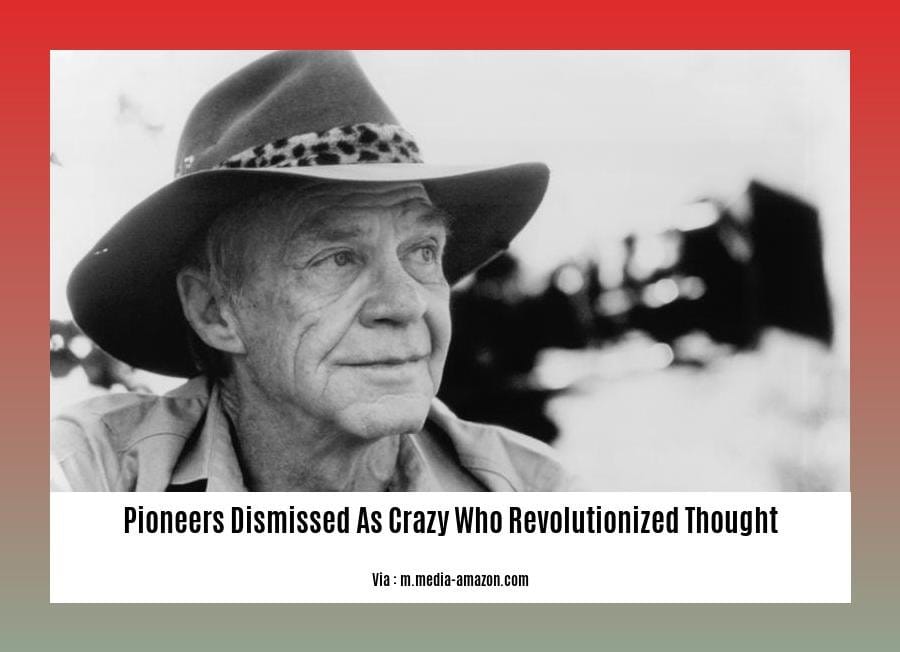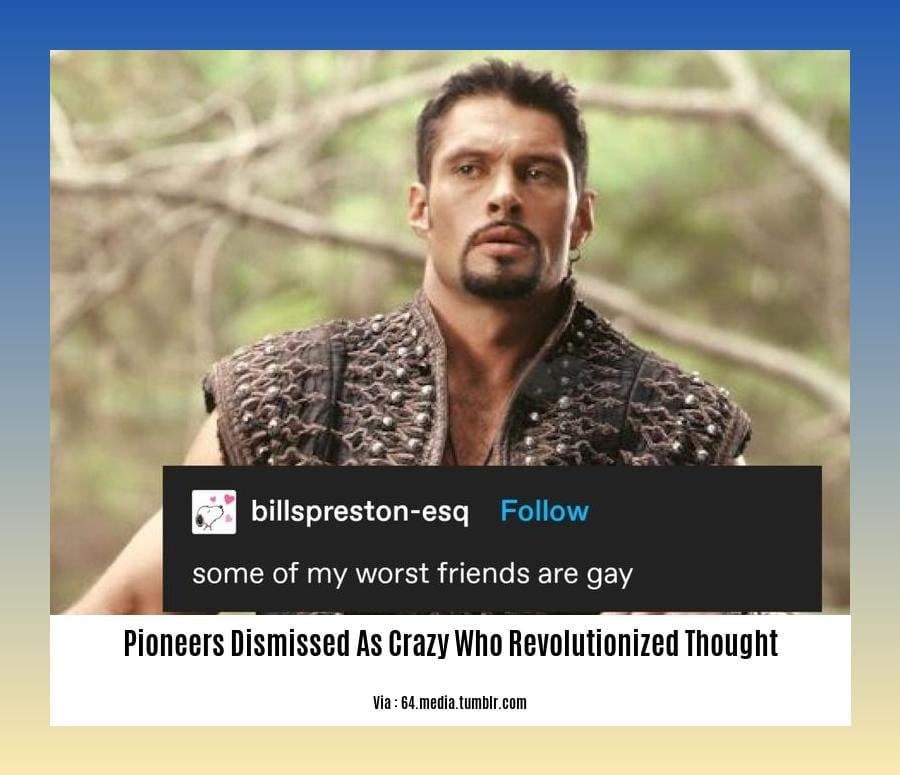In the annals of scientific history, countless pioneers have been branded as eccentric, their ideas ridiculed or dismissed. Yet, these visionaries, with unwavering determination, challenged established norms and revolutionized thought. Here, we delve into the stories of these pioneers, the unsung heroes of science, whose unconventional thinking laid the foundation for scientific progress. Join us as we uncover the struggles, triumphs, and brilliance of Pioneers Dismissed as Crazy Who Revolutionized Thought.
Key Takeaways:

- Bacterial Infections: Stomach ulcers are caused by bacteria, not stress, as proven by Barry Marshall’s self-infection experiment.
- Blood Circulation: William Harvey revolutionized medicine by describing the circulation of blood in the body.
- Hospital Hygiene: Handwashing prevents infection in hospitals, thanks to the advocacy of Ignaz Semmelweis.
- Genetics: Gregor Mendel established the laws of inheritance with his pea plant experiments.
- Immunotherapy: Bacterial toxins can be used to fight cancer, a concept pioneered by William B. Coley.
Pioneers Dismissed as Crazy Who Revolutionized Thought
Throughout the annals of science, there have been countless individuals whose groundbreaking ideas were initially met with skepticism, ridicule, and even outright dismissal. Yet, these pioneers dismissed as crazy possessed an unwavering belief in their theories and an unyielding determination to prove their validity.
William Harvey:
ChALLENGED: The prevailing belief that blood ebbed and flowed.
PROVED: Blood circulates through the body, pumped by the heart.
Barry Marshall:
CHALLENGED: The belief that stomach ulcers were caused by stress.
PROVED: Bacteria, Helicobacter pylori, are the primary cause of stomach ulcers.
Ignaz Semmelweis:
CHALLENGED: The prevailing practice of not washing hands in hospitals.
PROVED: Handwashing significantly reduces infection rates.
Gregor Mendel:
CHALLENGED: The established notions of inheritance.
PROVED: Developed the laws of inheritance through experiments with pea plants.
William B. Coley:
CHALLENGED: The belief that bacteria were harmful to humans.
PROVED: Bacterial toxins could be harnessed to fight cancer, paving the way for immunotherapy.
These pioneers dismissed as crazy endured countless obstacles and setbacks, but their unwavering belief in their ideas ultimately transformed the course of science and medicine. Their stories serve as a testament to the courage, perseverance, and audacity required to challenge the status quo and pursue groundbreaking discoveries.
Uncover the fascinating stories of pioneering thinkers whose theories were ridiculed, who dared to challenge the established norms and faced mockery for their visionary ideas. These laughingstocks turned pioneering visionaries persevered against adversity and ultimately gained recognition for their groundbreaking contributions. Meet the maverick pioneers whose ideas were initially mocked but ultimately revolutionized various fields.
The Struggle and Triumphs of Pioneers Who Dared to Defy Convention
Imagine daring to challenge deeply-rooted beliefs, risking mockery and skepticism? The struggle and triumphs of pioneers who dared to defy convention are a testament to the power of unconventional thinking. The creation of the US Constitution stands as a prime example.
American leaders realized the Articles of Confederation were inadequate post-Revolution. Thus, a Constitutional Convention was held in Philadelphia from 1787 to 1788.
A federalist structure was meticulously designed, balancing power between the federal government and individual states. The government would comprise three branches:
- Legislative (Congress)
- Executive (President)
- Judicial (Supreme Court)
The Great Compromise emerged as a crucial solution, creating a bicameral Congress. The House of Representatives would reflect population, while the Senate granted equal representation to each state.
Key Takeaways:
- Pioneers who challenge conventional wisdom possess unwavering belief and determination.
- The creation of the US Constitution exemplifies the transformative power of defying norms.
- The federalist structure ensures a balance of power between federal and state governments.
- The three branches of government provide checks and balances, preventing any one branch from becoming too dominant.
- The Great Compromise demonstrated the importance of compromise in forging a consensus.
Most Relevant URL Source:
The Impact of Unconventional Thinking on Scientific Progress
Have you ever wondered how some of the greatest scientific discoveries were made? Often, they began with unconventional ideas that were initially met with skepticism or even ridicule.
Unconventional Thinking Embraces Diverse Perspectives
Unconventional thinkers question established norms, embrace diverse perspectives, and challenge dominant paradigms. They’re often able to see connections and solutions that others miss, leading to transformative breakthroughs.
Overcoming Obstacles
The path for unconventional thinkers is not always easy. They often face opposition, criticism, and even rejection. But their passion and determination drive them forward, ultimately revolutionizing scientific thought.
Economic Models and Unconventional Thinking
Even in fields like economics, unconventional thinking can play a vital role. Economists who challenge established models and embrace diverse perspectives can make more accurate predictions and identify innovative solutions to economic challenges.
Key Takeaways:
- Unconventional thinking is crucial for scientific progress.
- Unconventional thinkers challenge the status quo and embrace diverse perspectives.
- Overcoming obstacles is essential for unconventional thinkers.
- Unconventional thinking has a significant impact on economic models.
Most Relevant URL Source:
The Power of Unconventional Thinking by David McWilliams on TED
Lessons learned from the journeys of pioneers who revolutionized thought
Over the years, I’ve learned a lot about the lessons learned from the journeys of pioneers who revolutionized thought. These individuals dared to challenge the status quo, and their stories offer valuable insights for us all.
Key Takeaways:
- Be willing to think differently. Pioneers are often willing to challenge the status quo and think outside the box. They’re not afraid to question the established norms or to come up with new ideas.
- Don’t be afraid to fail.失敗是創新的必經之路。先驅們往往願意冒險,即使他們知道自己可能會失敗。他們明白,失敗是學習和成長的一部分。
- Perseverance is key. Pioneers often face setbacks and challenges along the way. But they don’t give up. They keep going, even when things get tough.
- Collaboration is important. Pioneers often collaborate with others to achieve their goals. They know that they can’t do it alone, and they’re willing to share their ideas and work together.
- Make a difference in the world. Pioneers are driven by a desire to make a difference in the world. They want to leave a lasting legacy and to make the world a better place.

















